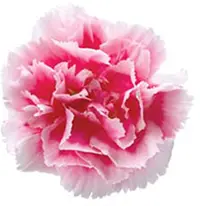
Origins of Carnation
Carnation essential oil is extracted from the well-known Dianthus caryophyllus flower, native to the Mediterranean region. This oil is characterized by its mildly sweet fragrance, intertwined with hints of honey and spice. Typically, it’s available in an “absolute” form, obtained through chemical solvent extraction. The term “carnation” is derived from the Latin ‘carnatio’, signifying “flesh.”
Historical Significance and Lore
Belonging to the Dianthus genus, these flowers are also referred to as “pinks.” The name “pink” originates from the Middle English ‘pinken’, meaning “to push or prick”—a nod to the flower petals’ serrated edges. The development of carnation perfume is credited to American perfumer Mary Chess. In the early 1930s, dissatisfied with commercial fragrances, Chess started creating her own scents using purely natural ingredients, pioneering the carnation perfume.
Varied Uses of Carnation Essential Oil
Healing Benefits
Carnation essential oil is a multi-faceted healer. As a massage oil, it nurtures, softens, and rejuvenates the skin. Its soothing aroma is known to promote relaxation and relieve stress. This oil effectively addresses skin issues like eczema, rosacea, rashes, and other irritations. Beyond skin care, it serves as a strengthening agent for those battling illness and can be used as an antidepressant or as a remedy for sleeplessness.
Personal and Spiritual Growth
Spiritually, carnation essential oil is both uplifting and motivating. It fosters feelings of openness and unity with the universe, allowing deep relaxation and enjoyment of life’s experiences. It aids in connecting with our innermost selves, helping to unravel hidden emotions and uncover true desires. Additionally, it’s recognized as a potent aphrodisiac, enhancing personal connections and intimacy.
